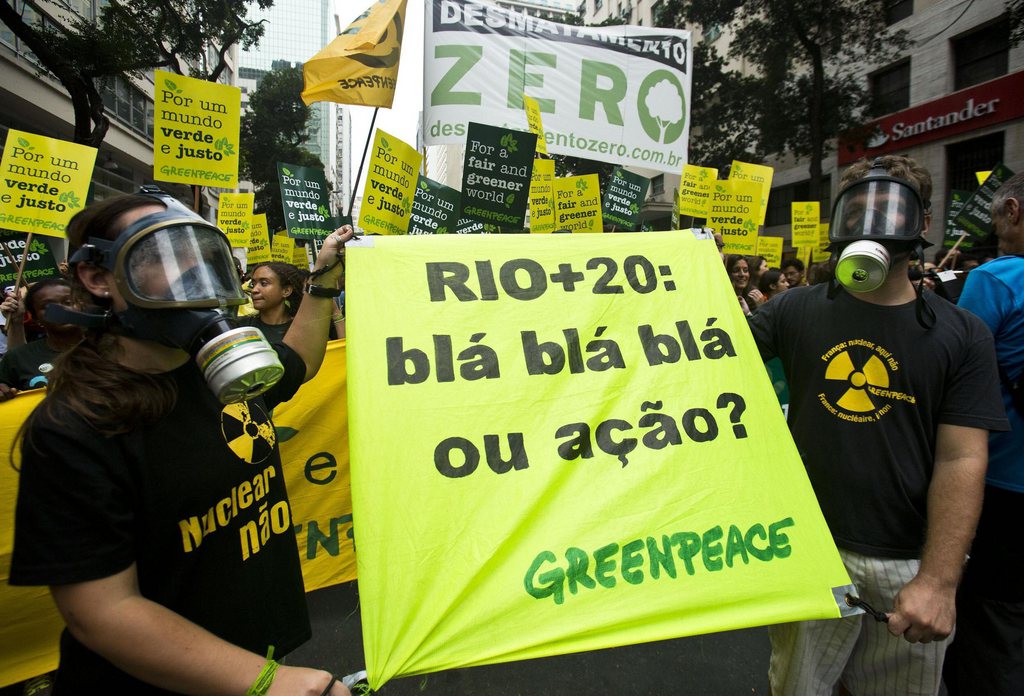
Swiss see only “some progress” in Rio+20 accord

Switzerland has criticised the final accord reached at the Rio+20 United Nations Conference on Sustainability, saying its measures are “generally not incisive enough to reduce resource consumption and eradicate poverty”.
The conference ended on Friday with a watered-down agreement that largely reaffirmed goals of the original 1992 Earth Summit but removed contentious proposals many activists said were needed to prevent serious environmental crises.
“This is an outcome that makes nobody happy. My job was to make everyone equally unhappy,” said Sha Zukang, secretary-general of the conference.
Instead of forging legally binding treaties, organisers said the purpose of the summit was to initiate a process to define a new set of development principles.
On the positive side, the Swiss delegation noted that the Rio resolution had marked the introduction of a “green economy” – defined as creating “well-being” and jobs without damaging the ecosystems – on the global policy agenda and had identified it as a “key tool” for living sustainably.
“The Rio final document achieves some progress, such as the creation of goals for sustainable development, but does not meet the challenge it poses in all respects,” said a statement from the Swiss delegation on Saturday.
Greenpeace executive director Kumi Naidoo noted: “We saw anything of value in the early text getting removed one by one. What is left is the clear sense that the future we want is not one our leaders can actually deliver.”
The accord “encourages” countries to implement a green economy as part of their sustainable development policies.
In Switzerland’s case, Environment Minister Doris Leuthard will be drawing up a report on the green economy by the end of the year for government review. The cabinet already defined six areas of action for a green economy back in 2010, including the greening of the tax system and the promotion of clean technologies.
Bottom-up approach
A ten-year programme for sustainable consumption and production patterns was also adopted by the 193 nations.
Switzerland said it played a significant role in the drafting process and made an important contribution to the programme for sustainable public procurement.
Switzerland noted that a “process” for the development of sustainability goals had begun in Rio. The delegation said there was “potential for real reform” with the creation of new high-ranking forum to replace the former Commission of Sustainable Development, although binding decisions about its formation were deferred.
The delegation added that the conference should not be “judged solely on the outcome of the negotiations”, referring to the various side events and numerous promises and advances made by individual countries, companies and other organisations.
One such event was the Corporate Sustainability Forum organised by the UN Global Compact and attended by 2,000 senior company representatives, including representatives from Switzerland. They signalled to the UN secretary-general that business was committed to the topic of sustainable development and aims to contribute to its achievement.
There is growing recognition of the validity of a bottom-up approach in addressing issues. Disillusionment with global summits on environmental policy has led many ecologists, activists and business leaders to believe that progress on environmental issues will be made locally with the private sector and without the help of international accords.
That sentiment was echoed by United States Secretary of State Hillary Clinton on Friday who said “governments alone cannot solve all the problems we face”.
In addressing the conference plenary on Thursday, Leuthard said that when it came to saving the environment, small countries such as Switzerland could not make a significant difference and that major world powers needed to do most of the heavy lifting.
Leuthard’s side discussions in Rio included lobbying for Geneva’s candidature as the headquarters of the Green Climate Fund, talks on the forthcoming UN biodiversity conference in India and the signing of an appeal by UN Women for greater gender equality.
The summit, known as Rio+20, was never expected to generate the sort of landmark accords signed at the 1992 Earth Summit in Rio, which included a treaty on biodiversity and agreements that led to the creation of the Kyoto protocol on greenhouse
The final accord reaffirms many of the goals of the 1992 summit. The word “reaffirm” is used 59 times in the 49-page document entitled “The Future We Want.” They reaffirm the need to achieve sustainable development (but not mandating how); reaffirm
commitment to strengthening international cooperation (just not right now); and reaffirm the need to achieve economic stability (with no new funding for the poorest nations).
Some of the biggest issues activists wanted to see in the document that didn’t make it in included a call to end subsidies for fossil fuels, language underscoring the reproductive rights of women, and some words on how nations might mutually agree to protect the high seas, areas that fall outside any national jurisdictions.
Throughout the three-day gathering and weeklong negotiations beforehand, the streets of central Rio and surrounding the suburban conference hall that hosted the summit were filled with
demonstrations by activists ranging from Indian tribes to environmentalists to anti-nuclear protesters.

In compliance with the JTI standards
More: SWI swissinfo.ch certified by the Journalism Trust Initiative




























You can find an overview of ongoing debates with our journalists here . Please join us!
If you want to start a conversation about a topic raised in this article or want to report factual errors, email us at english@swissinfo.ch.